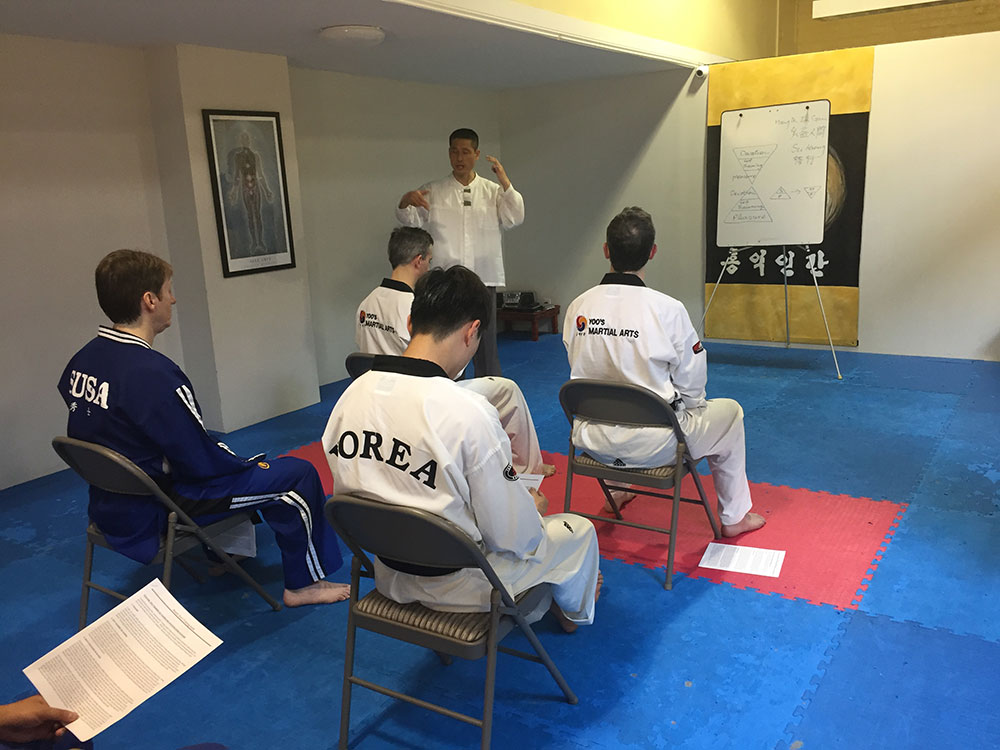
PLEASURE, SELF-TRAINING (SU HAENG) AND DEVOTION (HONG IK IN GAN)

True happiness comes from a balanced life. A deep study of Martial Arts can help an individual in determining what priorities to set forth in achieving balance. Which aspects of life are valuable enough to continuously progress in? Our lives can be divided into three of main categories: pleasure, self-training (Su Haeng) and devotion (Hong Ik In Gan).
1. PLEASURE
In life, no matter what, we wish to experience some pleasures. Examples of these pleasures are food and sleep. Although these do constitute basic necessities required for survival, their quantity and quality can sometimes be excessive. Everyone must eat, but it is not necessary to eat too often or more than is necessary. Everyone must sleep but not everyone needs to sleep as much as they want. You may need to go online to research something, but you don’t need to procrastinate or search unnecessarily. You may need a watch to tell the time, but you certainly don’t need an expensive watch. Pursuing pleasure to excess can be detrimental and take away from the two other categories of life.
2. SELF-TRAINING (SU HAENG)
Self-training is the development of oneself. Some examples of self-training in martial arts are pushups, sit-ups, running, meditation, etc.. Self-training by achieving goals makes us feel good and confident. During self-training positive hormones get released into our bodies. These hormones allow us to feel good, and benefit us in all areas of life. Once a person discovers the benefits of physical training and meditation, it becomes difficult to miss because of the negative feelings that harvest within us resulting from negative thoughts and hormones when we miss self-training. The Korean word Su Haeng means Clean out and Go! This term is used to describe the effect of self-training. It cleans out your body (physical body, energy body and spiritual body) and allows us to go towards devotion. Through Su Haeng, a corner stone of our life, we can better understand that there should be a shift from seeking material/physical pleasure towards self-training and devotion to others.
3. DEVOTION (HONG IK IN GAN)
Devotion to what you may ask? Devotion is called Hong Ik In Gan in Korean, which roughly translates to achieving overflowing energy that helps the people around you. Devotion is doing our best with sincere efforts in the walk of life just given to us. By doing our best with sincerity, we already benefit humanity in our role as earth humans. But depending on our energy level built through self-training (Su Haeng), our energy could be overflowing or dried away, thus resulting in different degrees of benefitting humanity. Some may pick up the garbage on the public street forever, while others may become fine leaders of society and awaken people’s conscience rather than throw their conscience on the public street. We can easily distinguish which one is a higher degree of devotion. By achieving a higher level of devotion, our Hong Ik In Gan energy will move forward and amplify the sharing of good deeds.
Striking a balance between pleasure, self-training and devotion is the challenge. When excessive pleasure is sought it takes time away from self-training and devotion. Usually, it takes away more from devotion because most of us are reluctant to cut back on self-training since we have experienced benefits of self-training. Without self-training we are more likely to fall into a negative condition because our system is not releasing positive hormones. When this happens, the wiser choice to help ourselves is to cut back on self-training and keep the time committed to devotion unchanged. Receiving negative feeling from loss of self-training and lack of confidence in front of people while devoting ourselves to people will lead us to regret what we did and persuade us not to repeat it again. Through our Su Haeng and Hong Ik In Gan (self-training and devotion), we learn to relinquish pleasure that keeps us in bondage and instead lead a balanced life and pursue that which brings us spiritual illumination.
Spoken by Ji do ja nim Yoo
Written by Hyun Sa Myung Duk (Drew Vanover), Shin Min (Patrick Malonso) and JiSun (Joe Lipman)
Edited by Hyun Sa Chun Shim (Carlos Stern)

